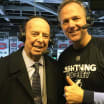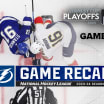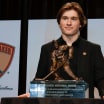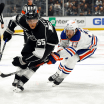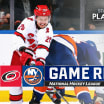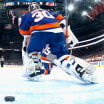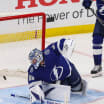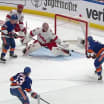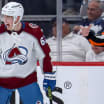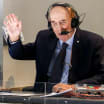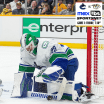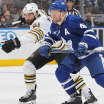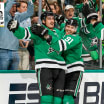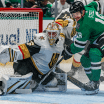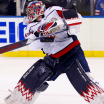NHL.com's Q&A feature called "Five Questions With …" will run every Tuesday through the 2017-18 regular season. We talk to key figures in the game and ask them questions to gain insight into their lives, careers and the latest news.
The latest edition features Hal Gill, a 2009 Stanley Cup champion with the Pittsburgh Penguins who is in his first season as the color commentator for the Nashville Predators radio broadcast:
Five Questions with Hal Gill
Predators broadcaster discusses his career, Subban's growth, media meals
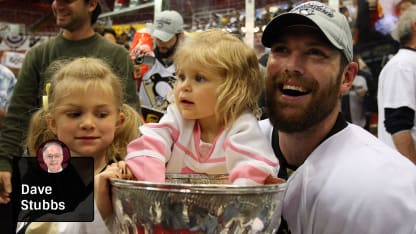
When veteran defenseman Hal Gill arrived for his first training camp with the Montreal Canadiens in 2009, 12 seasons into his 16-season NHL career and fresh off a Stanley Cup victory with the Pittsburgh Penguins, he suggested that he'd not be any reporter's go-to guy for a witty dressing-room quote or profound insight.
How wrong he was about that.
Today, the 42-year-old native of Concord, Massachusetts, is enjoying his new career, in his first season in the Nashville Predators broadcast booth alongside radio play-by-play voice Pete Weber.
"Hal has been great and he's fun to work with," Weber says of his partner. "He works at it."
As quick a study behind the microphone as he was a steady, shot-blocking defenseman, Gill also features a wicked sense of humor with a streak of mischief as wide as the wingspan of his 6-foot-7 frame.
If he got his kicks at the expense of others, he also could be self-deprecating as well. During his time in Montreal, before a 2012 trade to the Predators, he had a litany of funny episodes and anecdotes. Here is one at the expense of a teammate:
When 5-foot-7 Brian Gionta was named Canadiens captain Sept. 29, 2010, the staff put a 6-inch-tall plywood box in front of his dressing-room stall for him to stand on for the benefit of TV cameras. Sitting across the room, Gill saw this and quietly went off and returned with a second box to stack on top of it. Gionta howled when he arrived, knowing it was the work of Gill, who had been named an alternate captain.
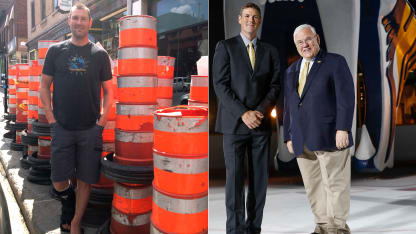
An even better one, at Gill's own expense. In May 2012, wearing a walking boot on his right foot after a steel plate and three pins had been surgically implanted in an ankle shattered by a shot, Gill happened upon a forest of orange construction cones on a Montreal sidewalk. Speed and mobility not among his strengths, he seized the opportunity and had his wife Anne take his photo among the tall pylons. On his Twitter account, @Skillsy75, he tweeted the image with the words: "I'm the highest paid one!"
Gill and his wife are happily settled with their children -- daughters Isabelle, 13, and Sophie, 10, and son Talon, 6 -- in Nashville.
"One of the reasons I took the Nashville job is that it's somewhere that we would want to move," he said. "It's a nice place to live, an easy lifestyle, and we really enjoyed our time there."
On Monday, on the eve of the 20th anniversary of his first game in the NHL, Gill spoke with NHL.com from New York.
Here are Five Questions With … Hal Gill.
How do you tell anyone what it feels like to win the Stanley Cup?
"What I miss most about the NHL is the moment when you've given all you've got and you can hardly stand. There's a photo of me in 2009 with my daughters that's one of my favorite pictures. It was really cool to have them there. To realize your dream is amazing. People ask, 'What's it like to lift the Stanley Cup?' Don't get me wrong, I love the Stanley Cup and all it represents, but it's really about all the emotions you have when you win it. You can't simply explain what it's like to lift the Stanley Cup. You have to go through all of what it takes to get to that point and have those emotions when you're lifting it. That's what I remember the most. What I tell people is that it takes four rounds to win the Cup but they might be four very different rounds. One might be a physical series, another a fast series, another a tight-checking series. You really have to change your game and that's what makes it fun. You have to go through the ups and downs. It's not very often you get 16 straight wins. It's the roller coaster that makes it that much more fun."
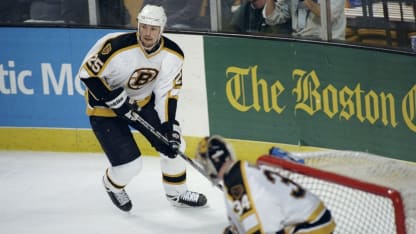
© Craig Melvin
You played your first of 1,219 combined NHL regular-season and playoff games 20 years ago, a 2-0 win for your Boston Bruins at Vancouver on Oct. 17, 1997. You had a Bruins-low of 5:09 of ice time on seven shifts. Did you barge into the office of general manager Harry Sinden and demand a trade?
"Twenty years? That's funny, I wouldn't have known. That's more ice time than I thought I got. As I remember, I was shell-shocked, froze up and was terrified. I got out there and I think my first shift I nearly put it into our own net. I don't remember too many shifts after that. I do remember when I got back from the West Coast road swing they said, 'You've got to play,' so I went to the minors and played and when I came back I realized I had to just play and not worry about what I was doing out there. It felt much more comfortable when I got back."
From the day you broke into the League until now, how has the game and the rules changed to evolve the position of defense?
"The game has gone away from a contact sport to a collision sport. It used to be you'd go grab a guy and hold him, hook him, pin him to the boards and wrestle and push. When you get to 2005, when the NHL returned after the lockout, the rules changed. No more holding, no more hooking, there was more slashing and hitting. You'd have to try to whack a guy's hands. You couldn't hook his hands but you could whack his stick. Now they're taking that away. Defensively now you just have to be fast and recover your position. If you lose position, for the most part you're done. You can't recoup that loss. If a guy cuts around you, you can't give him a little whack to gain that space back. It's very rare that you can grab a guy and ride him out and play the body that way. It has to be a collision, a big hit, or you must have good defensive posture. It goes without saying that I'd spend most of my time in the penalty box. Everyone in the NHL now has to change the way they play their game. Forwards are going to take advantage of all the weaknesses that are given by the new rules and the [defensemen] are going to have to adjust to it. You'll see an adjustment period for the [defensemen]. I talk about unintended consequences and I think that's what you might see, more of a team defensive posture that's not as aggressive. I hope that isn't the case because I think everyone enjoys the offense, but I think that's where it will head."
You get to see a lot of a guy named P.K. Subban, a former defense partner in Montreal from his first days in the NHL who now is a cornerstone of Nashville's defense. Is he as good a quote as you?
"I think he's fantastic. If you want an opinion, he'll give it to you. He's pretty honest. What's impressed me … is that P.K. will own up to his mistakes and he'll work hard to change. I kind of hate myself because in Montreal, when I was supposed to be his mentor, I'd tell him, 'P.K., just be quiet, you don't have to be crazy.' I think he's a great part of the game. At the time, I was telling him, 'Just fly under the radar and win some games,' but he really is exciting and that's great for the game. I love to see all the stuff he's done with his Blueline Buddies program, the way he's handled himself in situations where he could have made different statements and been a little more outlandish. I feel like he always does the right thing and every time I talk to him about it he talks about his father. He's got a great upbringing and does everything the right way now. When he was a young kid, when I was playing with him, he was exuberant, rambunctious, fun to be around, and let's just say it was a lot of work. But I do appreciate him now more than I ever have."
How has the transition been from NHL player to retirement to the broadcast booth, and have there been any revelations?
"A lot of learning. I retired [in April 2015] and coached high-school hockey, which I really enjoyed. I got involved with the Florida Panthers doing player development, which was a lot of fun. I learned a lot doing that. You have to play the game the right way. There's a lot of learning; when to say things, not say things, when to stop and listen. The Panthers went through some changes that I wasn't a part of, so I went back to coaching high school again. I figured I'd try the Predators broadcast thing because I wanted to be around the game, stay involved, and I've enjoyed it so far. It's another learning curve. … I would never try to be anyone but me. If I tried to pattern myself after someone else, I'd be miserable. I tell my boss every day, 'If you don't like what I'm doing, let me know and I'll try to be better, but I'm still going to be me.' I grew up watching the Bruins. I was a homer. I remember [broadcasters] Fred Cusick and Derek Sanderson, watching them on TV38, banging on the side of the TV every time it went fuzzy. All I know is that Boston's Lyndon Byers never lost a fight.
"As for a revelation, I've had to learn about the media meals at arenas. You can't just stuff your face during the day because there's a media meal and then they bring something up between periods and you're going to eat that. Nashville pulled out an opening-night spread that was lights out. Follow me on Twitter and you'll see that I've been doing a breakdown of every team's media meal. That's another side of the game that I never knew existed. I didn't know you media guys were enjoying yourselves that much, eating all that food. It was a surprise to me."
